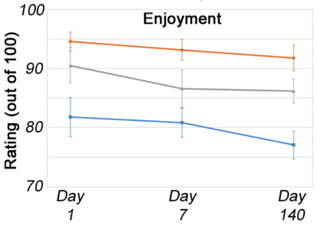Memory
Why You Should Stop Binge-Watching
It's less fun and you'll forget what you watched anyway.
Posted March 10, 2021 Reviewed by Gary Drevitch
- Many viewers have moved away from traditional ways of watching TV shows—sitting down at the same time each week to view a single episode, then waiting 7 days for the next one.
- Research suggests that binge-watching may be more enjoyable in the moment but that, over time, people who view shows this way retain less of the plot.
- Research also finds that those who watch a show in weekly installments rate the program more positively than those who binge.
Recently, TV critic Brian Grubb published an essay arguing that it's simply more fun to watch TV series that releases weekly episodes compared to those that dump a full season on a streaming platform all at once. He cited recent popular examples like WandaVision, The Mandalorian, and Ted Lasso. As he put it:
"I think [the sort of ongoing] conversation is what I miss most when a show dumps its episodes all at once. It becomes impossible to talk about it in any sort of organized way. Everyone is on a different episode and some people finished everything the first weekend and some people keep saying they 'will get to it' but the lift of ten episodes feels too daunting for them to get into when there’s an expectation to get to the end as fast as possible. ... Shows are good. Episodes are good. Stopping to think about what you saw and talking about it with other people who just saw the same thing is good. We should do more good things."
I wholeheartedly agree, and not just because binge-watching episode dumps causes you to miss out on the social aspects of enjoying a show. (Here's my pitch for a new game show: Two strangers get $1 million if they can find one show they've both watched in the past month within 30 seconds. Unwinnable.) But binge-watching is also probably a pretty poor way to watch TV if you want to actually remember what you watched five months later‚ or 18 months later when the next season of eight episodes finally gets posted.
There are two reasons for this that have to do with basic memory principles.
1. Elaborative encoding: Forming stronger connections
Grubb was onto something when he wrote that "stopping to think about what you saw and talking about it with other people" is good. It's especially good for memory.
Online discussions, conversations with friends, and idle anticipation and speculation that flourish in the periods between episodes on a weekly release schedule support better memory through a well-known memory principle called elaborative encoding. The basic idea is that the more connections you make between a new piece of information to things you already know, and the richer those connections are, the stronger the resulting memory becomes.

2. The spacing effect: Spread out to learn more
The spacing effect is a well-documented memory effect in which people retain more information if they space out their studying over time instead of doing all of it in a single block. For example, if you wanted to learn a set of new vocabulary words and had one hour to study, you would likely remember more if you studied the words six times for 10 minutes each time over the course of a day instead of studying them for a single one-hour period.
This example might sound directly analogous to the difference between weekly episodes and binge-watching. Conclusion: Watching weekly episodes would lead to better memory of a show. But the analogy isn't perfect. A perfect analogy would be one in which you watched the same episode on every viewing. In fact, as recently as 2014, there was scant evidence testing the spacing effect in situations truly analogous to binge-watching. At the time, Nate Kornell, a memory researcher, wrote for Psychology Today:
"Someone should do a study where non-repetitions are spaced or massed, for example asking participants to read 5 chapters of a book all on one day or across 5 days. Or how about this: does binge-watching an entire season of a TV show in 2 days lead to better or worse memory than watching one episode a week? But until these studies are done, it's premature to recommend spacing of non-repetitions."
A binge-watching study
In 2017, Jared Hovarth, Alex Horton, Jason Lodge, and John Hattie did exactly the sort of study Nate Kornell suggested.

Their study had three groups with 17 subjects in each group. All watched a six-episode series (BBC's The Game). One group (the binge-watching group) watched the whole series in one day, one group watched one episode per day, and one group watched one episode per week. Immediately after finishing the series, all of the subjects took a memory test containing factual questions about events from the show. They repeated this test 24 hours later and again 140 days later.
The researchers found that immediately after finishing the series, the binge-watching group had the best memory. But the accuracy of their memories declined more over time than the accuracy of the memories of the subjects in the other groups — results exactly in line with past research on the spacing effect. (Admittedly, the differences were not huge, but statistically significant. Immediately after watching, the binge-watchers scored an average of about 4 points higher on a 40-point free-recall quiz about the show than the weekly viewers; 140 days out, the weekly viewers' average scores beat the binge-watchers by about 2 points.)

At this point, you might be thinking, "I don't care how much I remember five months later; I just like binge-watching more." These subjects apparently disagreed. The researchers also asked them to rate how much they enjoyed the series on a 100-point scale. The weekly viewers rated it an average of 91 compared to an average of 81 from the binge-watchers, a difference that was statistically significant.
Face it: Binge-watching isn't a great way to watch TV. It's generally less fun and you retain less of what you watched. Let's go back to watching TV the way it was meant to be watched: at a predetermined time and day each week, chosen by network executives and marketers to maximize viewership, ad revenue, and demographic appeal. Sounds magical, right?




